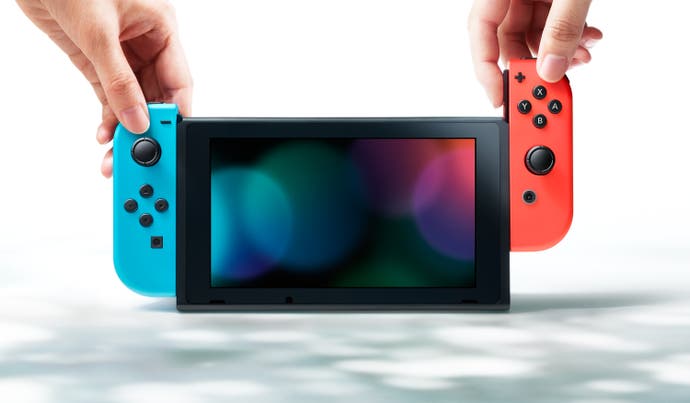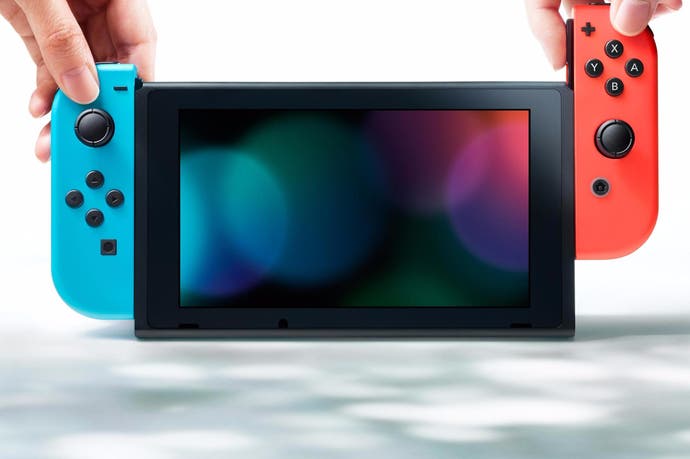Switch Joy-Cons tested: are there really de-sync issues?
UPDATED: Does the system's day one patch resolve the connectivity problems?
UPDATE 2/3/17 4:00pm: The Nintendo Switch's day one system update has launched, and there are reports online that installing the patch with the Joy-Cons attached updates the firmware on the controllers, resolving the de-sync issues. Is this really the case? Unfortunately not. We've updated our console with controllers attached and re-run the battery of tests detailed below. In all cases, the range and consistency of the connection of each Joy-Con remains the same, and the left controller still has demonstrably weaker range than the right. Eurogamer has contacted Nintendo several times now concerning this issue, and we still await a reply.
Original story: A recurring issue mentioned in several Nintendo Switch hardware previews over the last few days concerns the quality of the wireless connection between the console and its satellite controllers - the Joy-Cons. Several reports state that there have been issues with the left Joy-Con in particular, de-syncing momentarily from the main unit, leaving Switch users unable to properly control their games.
Out of the entire Eurogamer team, editor Oli Welsh has spent the most time with the system as he reviews The Legend of Zelda: Breath of the Wild. For the vast majority of the experience, gameplay has been flawless. However, on a couple of occasions, the left Joy-Con did appear to lose contact - with no obvious obstruction between controller and console. The Switch was docked and only 1m away from the Joy-Con. On a few other occasions, in similar circumstances, control was disrupted, with the Joy-Con unresponsive or responding erratically to movement inputs on the stick. On all occasions, the disruption lasted a few seconds and then fixed itself.
So, to what extent is this a real issue and is it only the left controller that is actually affected? After all, in Breath of the Wild, the left Joy-Con controls character movement - both may be affected, but the right controller may simply not have been in use at the time. At Digital Foundry, we decided to put some science into action to figure out whether the signal strength from both controllers is indeed equal - or not. The bottom line? While we didn't encounter any issues like Oli's in our more limited testing, we can confirm that one Joy-Con syncs better with the console than the other.
We tested each Joy-Con at varying distances, using the console's calibration menu to spin each stick around to catch any signal hiccups. There were no issues at all in a smaller room, or playing nearby in portable mode. And in fact, both Joy-Cons work from well from over eight metres away in a larger room. It's fine, even with people walking past in front - as long as the controllers are pointed towards the screen.

| Joy-Con Sync Quality | Left Joy-Con (Pointing Forward) | Left Joy-Con (Obstructed) | Right Joy-Con (Pointing Forward) | Right Joy-Con (Obstructed) |
|---|---|---|---|---|
| One Metre | Perfect | Perfect | Perfect | Perfect |
| Two Metres | Perfect | Slight Drops | Perfect | Perfect |
| Three Metres | Perfect | Heavy Drops | Perfect | Perfect |
| Four Metres | Perfect | Heavy Drops | Perfect | Perfect |
| Five Metres | Perfect | Heavy Drops | Perfect | Slight Drops |
| Six Metres | Perfect | No Response | Perfect | Heavy Drops |
However, there is an issue if either controller is too heavily obstructed, and the left-side controller definitely appears to have a weaker connection than its sibling. Each Joy-Con loses signal once covered completely with your hands, or put behind your back. Even at two metres, the left Joy-Con's connection starts to break up when held obstructed, leaving a choppier circular movement on the calibration screen. Keeping it in that position, that progresses to a more erratic signal at three metres, and practically no connection at six metres. But pointing the control forward again, it works again immediately.
By comparison, the right Joy-Con doesn't show these symptoms to the same extent, but they are there. The break-up in signal kicks in only slightly at five metres in that case, and again, only with the control held behind your back. Even swapping hands to account for a difference in angle, it's fair to say the left Joy-Con has bigger issues when obstructed.
So both have signal cuts when pushed, and the left one's more prone to it - but is it really an issue? Well for the majority of gameplay, you should be absolutely fine. The signal strength is generally resilient, but not as strong as a regular gamepad. Being held in small, enclosed spaces, or pressed against something obstructing its path does it no favours. The fact there is a difference at all between the two Joy-Cons here is curious though. After all, the right Joy-Con has only two spec differences, in its extra infra-red pointer and NFC chip. Besides this, the two are really identical, and it's not enough to pinpoint exactly where the difference comes from.
On the face of it, our testing presents credible evidence that one controller has a more solid connection to the base unit than the other, but overall, we had few issues once the limitations of the system were known. But what is a concern is that although very infrequent, Oli's momentary controller glitches happened at very close range to the machine. In terms of the number of hours spent playing games on Switch, he's way ahead of us - and situated so close to the console, we would expect a rock solid sync at all times. It suggests that the weakness of the left controller may present further issues, at a much closer range, in a much more intermittent manner. Our testing, when combined with the range of reports from a relatively small amount of units distributed to press, does make us wonder how this will scale up to a worldwide roll-out encompassing millions of units.
Eurogamer asked Nintendo to comment several days ago, and we'll report back if and when we get a response.

